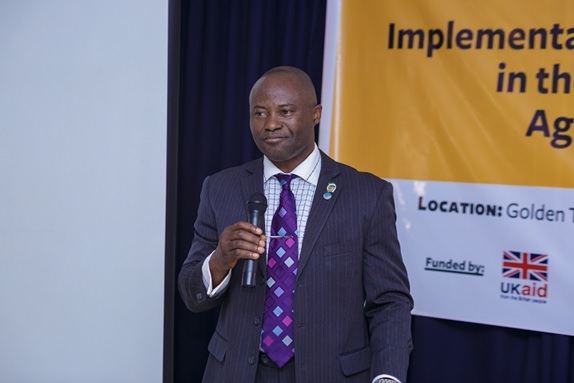By Ahmed Sahid Nasralla (De Monk)
Sierra Leone’s Minister of Lands, Housing and Environment, Dr. Dennis Sandy, has urged stakeholders to join his ministry to adopt an inclusive system in the administration and development of land in the small West African country.
Speaking at a one-day workshop on the Implementation of the National Land Policy in the context of Responsible Agricultural Investments organized by Solidaridad Sierra Leone on Tuesday at the Golden Tulip Hotel, Freetown, Dr. Sandy emphasized that the land governance situation in the country is a cause for concern.
“The land situation in the country is really, really serious; that is why we must ensure an all-inclusive system (driven by the ministry and land owning families) that strengthens relations for planning, administration and land use for proper management and development of the agricultural sector,” said Dr. Sandy.
The Minister of Lands, who described his presence at the workshop as a demonstration of his ministry’s commitment to the issues of land in the country, noted that nowadays people sign contract for land in rural areas without even consulting his Ministry (and Government) which he said is against the laws of the land.
“Our role as a ministry does not only stop at surveying exercises,” he clarified. “My ministry should be involved in all arrangements, from start to finish. We know we have challenges with our two land tenure systems, but the practice of our local authorities giving land to investors for commercial use without our consent must stop.”
At the same workshop, Dr. Sandy’s colleague, Deputy Minister of Local Government and Rural Development Hon. Tetema Tondoneh equally lamented the exclusion of his ministry in land development in the rural areas.
Meanwhile, the Lands minister warned that agricultural investment- no matter how huge the capital involved- should not be at the expense of the environment.
“Every investment in our land should take into account the conservation, protection and promotion of our environment. My ministry should be at the fore front of every land use,” he said, adding that more often than not rural people depend on land for their livelihood and their rights must be safeguarded.
The workshop, organized by Solidaridad, seeks to share experiences and lessons learnt from their successful intervention in Makpele chiefdom where tensions were mounting between the people and the company Natural Habitats Sierra Leone (NHSL) regarding the lease of 30,700 hectares of land for agricultural purposes. NHSL inherited the lease from West Africa Agriculture II but the people disowned the agreement claiming they were ignorant of such. Solidaridad’s intervention brought all stakeholders together through its DFID-funded LEGEND (Land: Enhancing Governance for Economic Development) project applying international best practices. One of the key outcomes is the reduction of the NHSL’s concession from 30,700 hectares to 2,320 hectares, with a total of 28,380 hectares ceding back to the people of Makpele chiefdom.
Solidaridad is a not-for-profit organization that works globally towards the sustainable production of commodities and has built a reputation as a catalyst for sustainable innovations in commodity supply chain in 50 years. The goal is to improve livelihoods for vulnerable producers, while respecting the environment, one another and the next generation.


